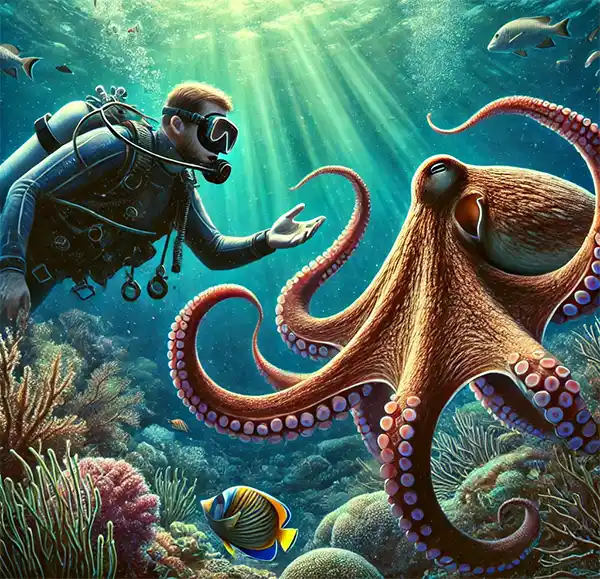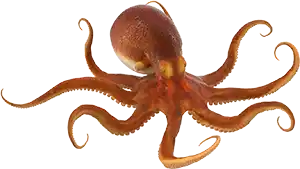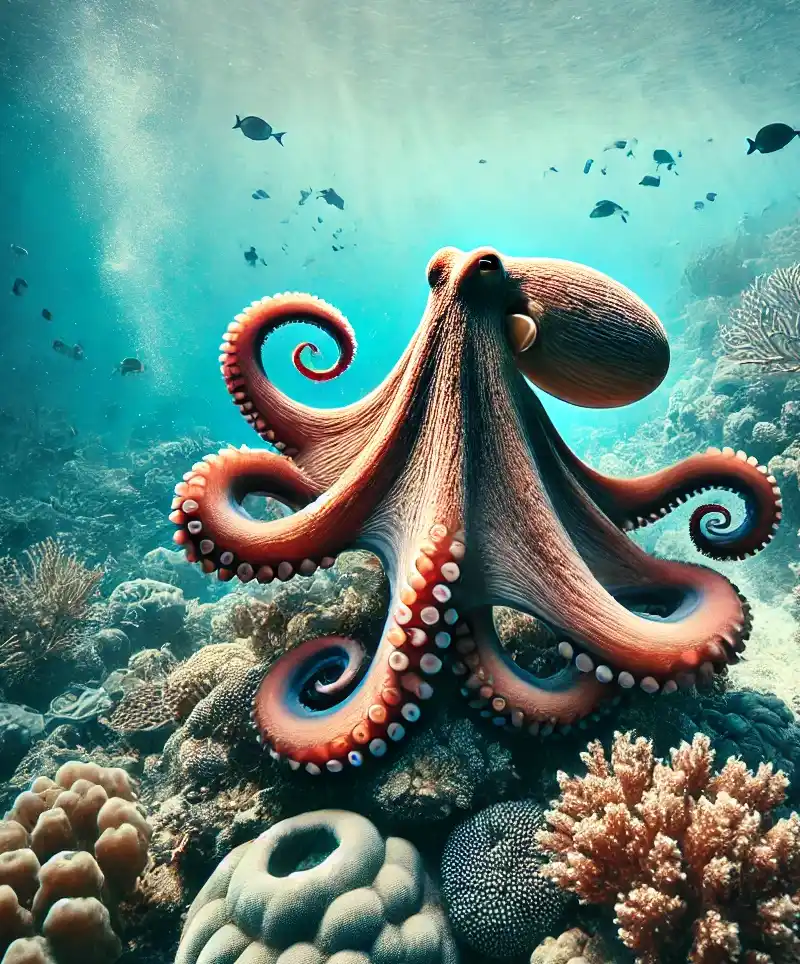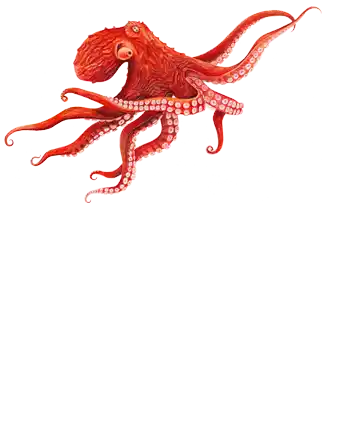Celebrating Nature’s Eight-Legged Genius
Every year on October 8th, we pay tribute to one of the ocean’s most fascinating and intelligent creatures—the Octopus. That’s right, it’s World Octopus Day, and there’s no better time to marvel at these cephalopodic wonders of the deep. Known for their remarkable intelligence, problem-solving skills, and ninja-level camouflage abilities, Octopuses are the ocean's equivalent of escape artists, and, let's face it, they're a lot more fun than most of the other things with tentacles. So, let’s explore the life and times of this eight-armed mastermind with a few fun (and slippery) facts.
Brains and Beauty
First things first—Octopuses are smart. Like, really smart. We’re talking smarter-than-your-average-pet smart, and potentially smarter than some of your neighbors. They can open jars (whether there’s food inside or not), solve mazes, use tools, and even recognize human faces. If your goldfish ever gave you a side-eye for forgetting to feed it, you can bet an Octopus would file a formal complaint.
 Each of an Octopus's arms can act independently, with its own mini-nervous system. Imagine having eight brains working in unison—suddenly, juggling seems like child’s play. And that doesn’t even account for the Octopus’s main brain, which coordinates it all. It’s no wonder scientists often compare Octopuses to the cognitive elite of the animal kingdom—think of them as the Einstein of the seas, only with way more arms (and no need for a chalkboard).
Each of an Octopus's arms can act independently, with its own mini-nervous system. Imagine having eight brains working in unison—suddenly, juggling seems like child’s play. And that doesn’t even account for the Octopus’s main brain, which coordinates it all. It’s no wonder scientists often compare Octopuses to the cognitive elite of the animal kingdom—think of them as the Einstein of the seas, only with way more arms (and no need for a chalkboard).
Camouflage Kings
If there’s one thing an Octopus loves more than solving puzzles, it’s showing off its incredible wardrobe changes. Octopuses have the superpower of instant camouflage, blending into their surroundings so seamlessly that even chameleons are jealous. Thanks to specialized skin cells called chromatophores, Octopuses can change color, pattern, and even texture in the blink of an eye.
Feel like lounging on a coral reef? No problem, just turn coral-colored and squishy. Need to blend into a rocky crevice? Time to go all craggy and brown. It’s like the Octopus is the James Bond of the animal world, always ready to vanish without a trace. And if all else fails, they have one last trick up their (many) sleeves: the classic ink cloud getaway. When an Octopus feels threatened, it can squirt a cloud of ink to confuse predators and make its slippery escape. Just think of it as the underwater equivalent of a ninja’s smoke bomb.
While their smarts and camouflage are impressive, let’s not forget the Octopus’s physical prowess. Those eight arms aren’t just for show—they’re equipped with hundreds of powerful suckers, each capable of tasting, touching, and grabbing prey (or your lunch, if you’re not paying attention). Ever been hugged by an Octopus? It’s like a bear hug but wetter and a bit more… clingy.
And speaking of anatomy, Octopuses have three hearts. That’s right, three! Two pump blood to the gills, while the third keeps the rest of the body running. You’d think with that many hearts, they’d be especially sentimental, but it turns out they’re pretty ruthless hunters. They feast on crabs, shrimp, and even small fish, using their powerful beaks to crack open shells like they’re at an all-you-can-eat seafood buffet. It’s a good thing they can’t crack open wallets, or we’d all be in trouble.
Escape Artists Extraordinaire
If Houdini had eight arms, he still wouldn’t hold a candle to the average Octopus. These creatures are master escape artists, capable of squeezing through tiny gaps that seem impossibly small for their large bodies. This flexibility is thanks to their lack of bones—they’re basically giant, squishy water balloons with brains.
Aquariums have learned the hard way that keeping an Octopus contained is no small feat. Many a tank has been left empty by an Octopus with a knack for unscrewing lids, slipping through drainpipes, and sneaking out like a phantom in the night. Some have even been caught crawling across the floor in search of a new tank to explore. If Octopuses had a Netflix special, it would definitely be called "The Great Escape (with Tentacles).
As amazing as Octopuses are, there’s one thing that’s a bit of a bummer—they don’t live very long. Most species have a lifespan of just one to two years, which is a real tragedy when you consider how much they pack into such a short amount of time. Even their courtship is intense. When two Octopuses decide to tango, it’s a cautious affair. Given that they’re solitary creatures, the whole mating process can be a little awkward. The male has to be careful not to get too close, lest he becomes a snack instead of a suitor. Romantic, right?
After laying her eggs, the female Octopus spends her remaining days guarding them until they hatch, at which point her life comes to an end. It’s a sad but noble end for such a remarkable creature. On the upside, her legacy lives on in the next generation of clever, camouflaging cephalopods.
Celebrating World Octopus Day
So, how do you celebrate World Octopus Day? Well, it’s simple—just think like an Octopus! Flex your brain with a good puzzle, challenge a friend to a game of hide-and-seek (spoiler: they’ll win if they can change color), or visit your local aquarium to watch these masters of disguise in action. You could also try an eight-armed dance move, but fair warning: it’s harder than it looks.
 And remember, Octopuses aren’t just incredibly cool creatures—they’re also vital to the ocean ecosystem, playing key roles as both predators and prey. Protecting the oceans means protecting our eight-legged friends, so let’s give a tentacle-waving salute to these brilliant, quirky creatures.
And remember, Octopuses aren’t just incredibly cool creatures—they’re also vital to the ocean ecosystem, playing key roles as both predators and prey. Protecting the oceans means protecting our eight-legged friends, so let’s give a tentacle-waving salute to these brilliant, quirky creatures.
From their exceptional intelligence to their dazzling camouflage skills, Octopuses remind us that there’s always more than meets the eye when it comes to the ocean’s mysteries. They may be short-lived, but Octopuses pack more life—and curiosity—into a couple of years than most of us do in a lifetime.
Happy World Octopus Day to all the tentacle enthusiasts out there!
Please Share our Content






 Each of an Octopus's arms can act independently, with its own mini-nervous system. Imagine having eight brains working in unison—suddenly, juggling seems like child’s play. And that doesn’t even account for the Octopus’s main brain, which coordinates it all. It’s no wonder scientists often compare Octopuses to the cognitive elite of the animal kingdom—think of them as the Einstein of the seas, only with way more arms (and no need for a chalkboard).
Each of an Octopus's arms can act independently, with its own mini-nervous system. Imagine having eight brains working in unison—suddenly, juggling seems like child’s play. And that doesn’t even account for the Octopus’s main brain, which coordinates it all. It’s no wonder scientists often compare Octopuses to the cognitive elite of the animal kingdom—think of them as the Einstein of the seas, only with way more arms (and no need for a chalkboard). And remember, Octopuses aren’t just incredibly cool creatures—they’re also vital to the ocean ecosystem, playing key roles as both predators and prey. Protecting the oceans means protecting our eight-legged friends, so let’s give a tentacle-waving salute to these brilliant, quirky creatures.
And remember, Octopuses aren’t just incredibly cool creatures—they’re also vital to the ocean ecosystem, playing key roles as both predators and prey. Protecting the oceans means protecting our eight-legged friends, so let’s give a tentacle-waving salute to these brilliant, quirky creatures.








 "Sláinte!" is a traditional Irish expression used as a toast, equivalent to "Cheers!" in English.
"Sláinte!" is a traditional Irish expression used as a toast, equivalent to "Cheers!" in English.